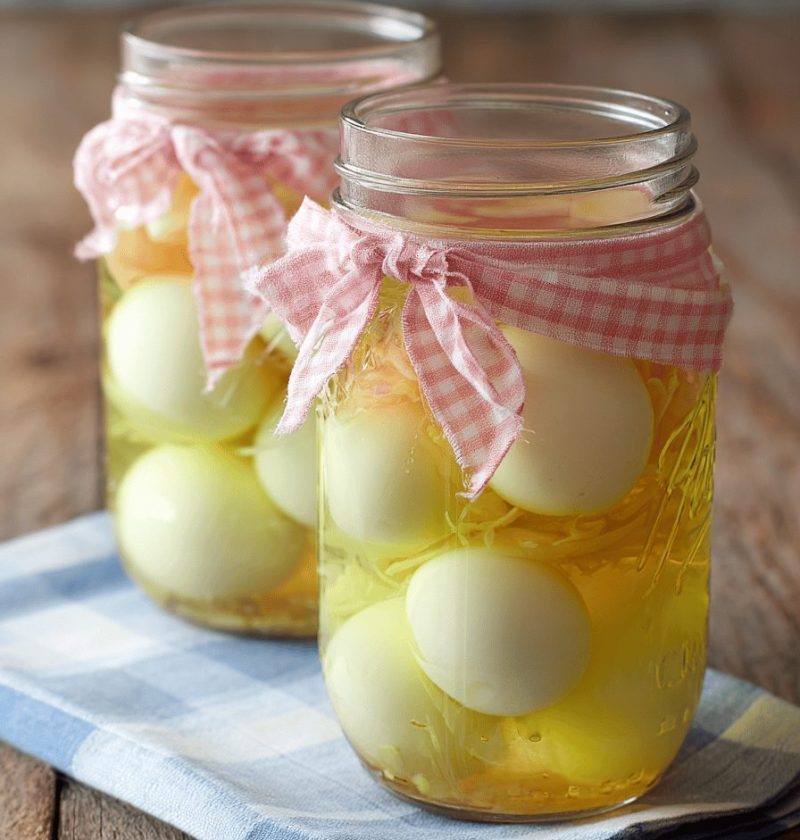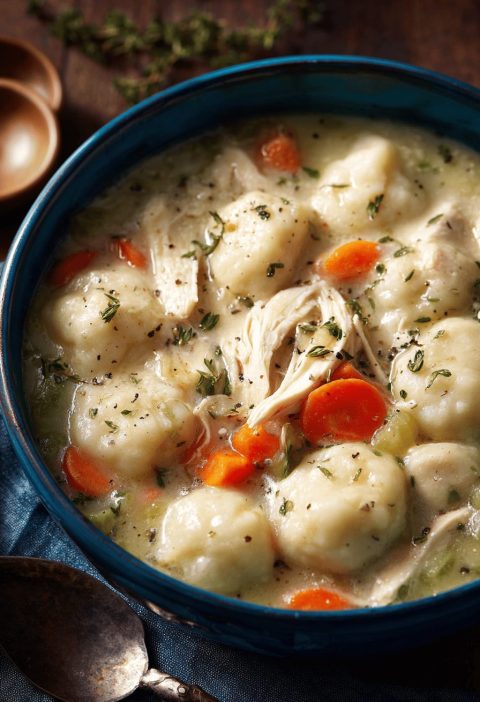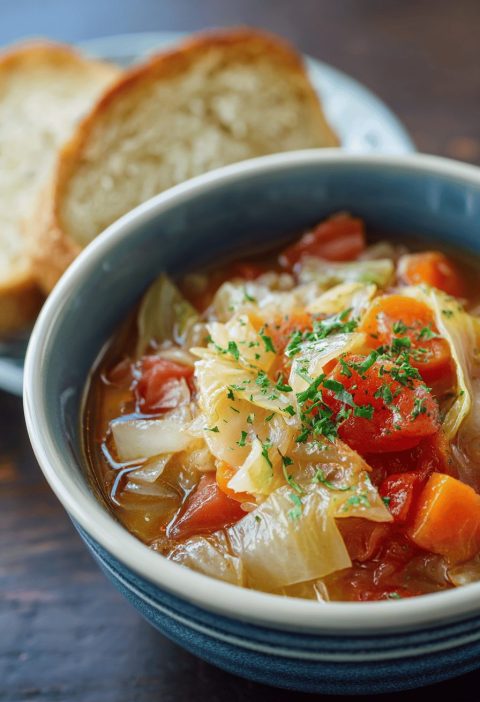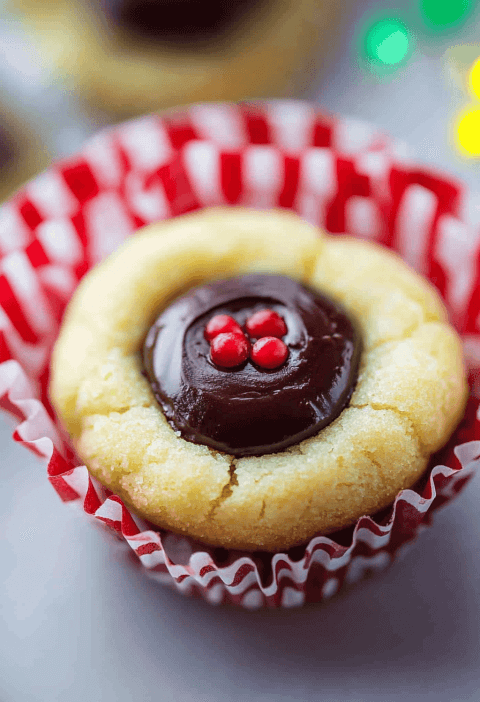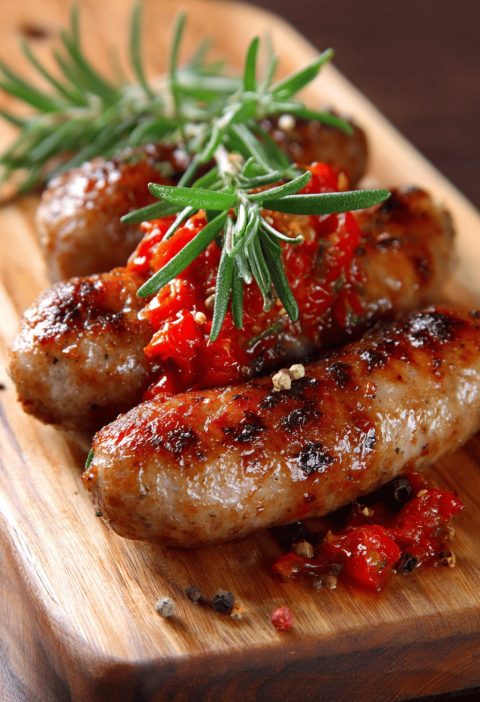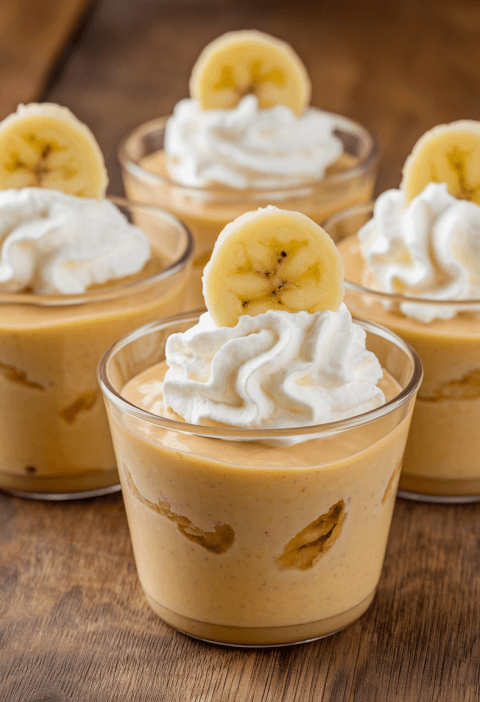Would you like to save this?
Pickled Eggs Recipe
These tangy, easy no-cook pickled eggs are a healthy, festive snack you can whip up with simple pantry staples and enjoy in under 24 hours.
If you’ve ever loved that sharp bite of vinegar balanced by warm spices, you’ll adore this Pickled Eggs Recipe. Pickled eggs are simply hard-boiled eggs soaked in a vinegar-based brine rich with spices—an age-old preserving trick that’s made a comeback as a homemade protein-packed snack. I first learned this method one crisp October afternoon, standing beside my grandmother’s kitchen counter in the Carolinas. She swore by a 1:1 ratio of 5% acidity distilled white vinegar and water for safety (keeping pH below 4.6) and tossed in bay leaves, peppercorns, and a pinch of sugar to mellow the tang. What makes these eggs extra special is how versatile they are—enjoyed straight from the jar, sliced into salads, or alongside charcuterie boards at summer picnics. Plus, with roughly 6 grams of protein per egg and minimal calories, they’re a smart choice for anyone tracking macros. Ready to preserve something delicious?
Why You’ll Love This Pickled Eggs Recipe
- No oven needed—just a saucepan and mason jar.
- Ready in under a day (24 hours for max tang).
- High-protein, low-calorie snack that beats chips.
- Customizable spice blend—mild to fiery.
- Shelf-stable in the fridge for up to 4 weeks.
- Perfect for holiday gift jars or potluck trays.
- Vegan-friendly brine options with apple cider vinegar swap.
- Crunchy beet slices add vibrant color and flavor.
Ingredients
• 12 large eggs (use pasture-raised or free-range for best taste)
• 2 cups distilled white vinegar (5% acidity; Heinz recommended)
• 2 cups filtered water (reduce chlorine for clearer brine)
• 1 tablespoon kosher salt (or sea salt; no iodized)
• 1 tablespoon granulated sugar (balances tang; optional)
• 1 teaspoon black peppercorns
• 2 bay leaves
• 1 teaspoon mustard seeds (yellow or brown)
• Pinch of red pepper flakes (or ¼ teaspoon for mild heat)
• Optional: ½ cup thin beet slices for pink color (pre-boil beets for 10 minutes)
• Optional swap: apple cider vinegar for a sweeter note
Tips:
– Room-temperature eggs peel more easily; bring cold eggs out 20 minutes before cooking.
– If your water is very hard, adding a splash of filtered water keeps the brine crystal-clear.
– Mustard seeds from McCormick pack a punch—choose spicy brown for extra warmth.
Directions
- Hard-boil the eggs. Place eggs in a single layer in a saucepan, cover with 1 inch of cold water, bring to a gentle boil over medium heat, then simmer for 10 minutes. Tip: use slightly older eggs—air gaps help shells detach cleanly.
- Shock and peel. Transfer eggs to an ice-water bath for 5 minutes to stop cooking. Gently crack shells all around, then peel under running water to remove stubborn bits. Set eggs aside on a paper towel.
- Make the brine. In a clean saucepan, combine vinegar, water, salt, sugar, peppercorns, bay leaves, mustard seeds, and red pepper flakes. Bring to a simmer, stirring until salt and sugar dissolve—about 3 minutes. Remove from heat.
- Layer eggs and extras in jar. Use a 1-quart sterilized mason jar (or two pint jars). Pack in peeled eggs, add beet slices or thin onion rings if using.
- Pour hot brine. Carefully ladle the warm brine over eggs until they’re fully submerged. Seal the jar tightly with a lid.
- Cool and refrigerate. Let the jar sit on the counter until it reaches room temperature (about 30 minutes), then transfer to the fridge. For best flavor, wait at least 24 hours—36–48 hours is optimal for peak tanginess.
Servings & Timing
Makes: 12 pickled eggs
Prep Time: 10 minutes (plus 20 minutes for boiling and cooling)
Brine Simmer: 5 minutes
Chill/Rest Time: Minimum 24 hours (up to 72 hours for deeper flavor)
Total Time: About 25 minutes active, 24–72 hours passive
Variations
• Curried Pickled Eggs: Stir in 1 teaspoon curry powder and ½ teaspoon turmeric for an Indian-inspired twist.
• Sweet Beet Brine: Increase sugar to 2 tablespoons and add sliced beets for a candy-like glaze.
• Dill & Garlic: Swap bay leaves for fresh dill sprigs and add a couple smashed garlic cloves.
• Spicy Sriracha: Mix 1 tablespoon Sriracha into the brine for a kick—great on charcuterie boards.
• Low-Sodium Version: Reduce salt to 1 teaspoon and boost herbs (thyme, rosemary) for flavor.
• Vegan “Egg” Alternative: Marinate thick slices of firm tofu in the same brine for a plant-based snack.
Storage & Reheating
Store pickled eggs in the fridge at 40°F or below. Properly sealed, they’ll stay bright and tangy for up to 4 weeks. There’s no reheating needed—just let them sit at room temperature for 10–15 minutes before serving if you prefer less chill. The brine deepens in flavor over time, so make ahead up to a week in advance for entertaining ease.
Notes
• I’ve learned that adjusting sugar and salt levels after day two gives you total control—taste once and tweak if you like.
• For extra-clear brine, strain out spices after day three and replace them with fresh ones—it refreshes the flavor.
• If you’re worried about acidity, a digital pH meter can confirm the juice is below 4.6, FDA-recommended for safe preserving.
• Leftover brine makes a zesty salad dressing—just whisk in olive oil, Dijon mustard, and chopped herbs.
FAQs
Q: How long do pickled eggs last?
A: Kept refrigerated, they remain fresh for up to four weeks; discard if cloudiness or off-smells appear.
Q: Can I use apple cider vinegar instead of white?
A: Absolutely—apple cider vinegar adds a slightly sweet, fruity note and keeps the brine clear if filtered.
Q: Why are my eggs cloudy or discolored?
A: Cloudiness often comes from spices or minerals in water; use filtered water and strain spices if you prefer clarity.
Q: Do I need to sterilize the jar?
A: It’s best practice—wash in hot, soapy water, rinse, then boil for 10 minutes or run through a dishwasher cycle.
Q: Can I heat the eggs before pickling?
A: No need—hard-boiled eggs soak up flavor best when cold and just peeled; reheating can turn yolks chalky.
Q: What’s the best ratio of vinegar to water?
A: A 1:1 ratio of 5% acidity vinegar to water ensures proper acidity (pH below 4.6) for safe preserving.
Q: Why did my shells stick?
A: Very fresh eggs can be harder to peel—buy or age eggs for a week so air pockets form, making peeling simpler.
Q: Can I make these on the stove in large batches?
A: Yes, scale the brine up by volume—just maintain that vinegar-to-water ratio and adjust spices accordingly.
Conclusion
This Pickled Eggs Recipe delivers a tangy, protein-rich snack that’s as easy as it is versatile. Whether you’re hosting a tailgate, sharing gift jars, or craving a crunchy post-workout bite, these eggs have you covered. Give them a try, let me know how they turned out, and don’t forget to explore my deviled eggs and pickled veggies recipes for more preserving fun!

Pickled Eggs Recipe
Ingredients
- 12 large eggs use pasture-raised or free-range for best taste
- 2 cups distilled white vinegar 5% acidity; Heinz recommended
- 2 cups filtered water reduce chlorine for clearer brine
- 1 tablespoon kosher salt or sea salt; no iodized
- 1 tablespoon granulated sugar balances tang; optional
- 1 teaspoon black peppercorns
- 2 bay leaves
- 1 teaspoon mustard seeds yellow or brown
- Pinch red pepper flakes or ¼ teaspoon for mild heat
- 1/2 cup thin beet slices for pink color (pre-boil beets for 10 minutes)
- apple cider vinegar for a sweeter note
Instructions
- Place eggs in a single layer in a saucepan, cover with 1 inch of cold water, bring to a gentle boil over medium heat, then simmer for 10 minutes.
- Transfer eggs to an ice-water bath for 5 minutes to stop cooking. Gently crack shells all around, then peel under running water to remove stubborn bits. Set eggs aside on a paper towel.
- In a clean saucepan, combine vinegar, water, salt, sugar, peppercorns, bay leaves, mustard seeds, and red pepper flakes. Bring to a simmer, stirring until salt and sugar dissolve—about 3 minutes. Remove from heat.
- Use a 1-quart sterilized mason jar (or two pint jars). Pack in peeled eggs, add beet slices or thin onion rings if using.
- Carefully ladle the warm brine over eggs until they’re fully submerged. Seal the jar tightly with a lid.
- Let the jar sit on the counter until it reaches room temperature (about 30 minutes), then transfer to the fridge. For best flavor, wait at least 24 hours—36–48 hours is optimal for peak tanginess.
Notes
- Mustard seeds from McCormick pack a punch—choose spicy brown for extra warmth.

